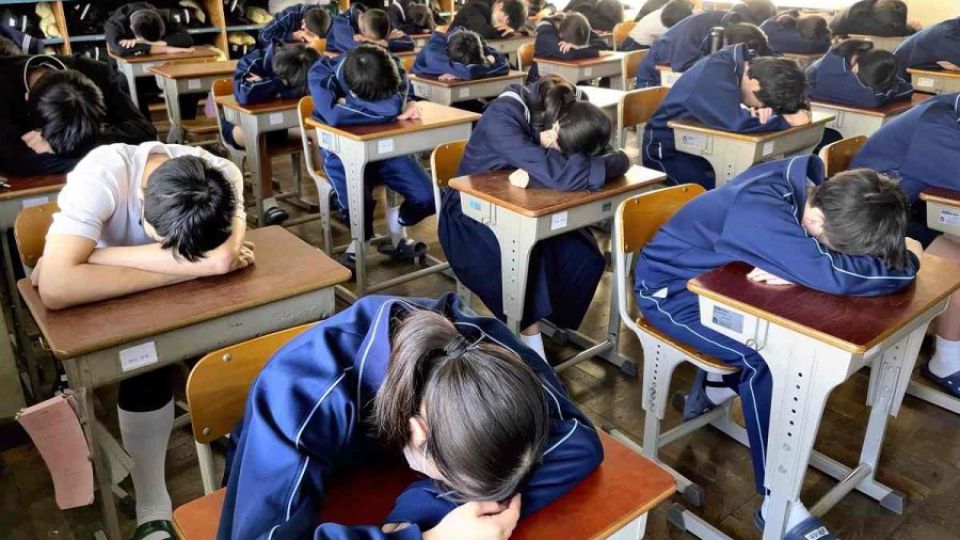April 1, 2024
TOKYO – More than half of school-age children are sleep-deprived, a large-scale survey conducted jointly by the University of Tokyo and Riken, National Research and Development Institute has revealed. One specialist attributed the lack of sleep to the increasingly busy schedules that children have, involving an unprecedented number of hours spent at cram schools and in after-school lessons as well as nighttime smartphone usage — in addition to attending regular school lessons and completing classwork.
Sleep deprivation can have a negative impact on physical and mental development, especially for growing children, and in some cases can result in disrupted daily routines and absences from school.
As a measure to reduce sleep deprivation in their students, an increasing number of schools have started allotting time for afternoon naps.
Day-night reversal
One 15-year-old from Saitama Prefecture started staying up late in the autumn of his second year at junior high school. It was around the same time he got a smartphone.
Even when it was past his usual bedtime of 10 p.m., he felt wide awake and found himself reaching for his smartphone. He would start playing video games to distract himself from that urgent feeling of having to fall asleep. When he finally drifted off, it was dawn. His day-night life cycle was flipped. In the third trimester, he stopped going to school.
In the spring of his third year, he went to a pediatric clinic for sleep disorders as an outpatient. The doctor diagnosed him with a circadian rhythm sleep disorder — a family of sleep disorders that develop when a patient’s internal clock and the 24-hour cycle are out of sync. He spent two weeks in hospital where he reestablished a regular sleep routine by waking up at 6 a.m., getting exposed to a strong light emitted by dedicated equipment, eating breakfast, limiting smartphone usage and gaming time, and going to sleep regularly at lights-out.
Following the therapy, he was able to sleep for seven hours straight a night and started reattending school this year.
Ministry revises ‘sleep guide’
A joint study team formed by the University of Tokyo and Riken has been conducting a large-scale survey of about 50,000 elementary, junior high, and high school students since September 2022. The researchers are seeking to understand the actual state of school-age children’s sleep patterns. On March 18, the team announced their interim results.
By January, they had examined the sleep patterns of about 7,700 children using dedicated equipment. The average sleep time was 7.90 hours for sixth grade elementary school students, 7.09 hours for third-year junior high school students, and 6.45 hours for third-year high school students. More than half of the children did not get the amount of sleep recommended by the Health, Labor and Welfare Ministry.
Yoichi Minami, a project associate professor at the University of Tokyo and a member of the study team, said, “We hope that not only the children themselves but also their parents and guardians will recognize how serious the problem is.”
The team will continue the survey through fiscal 2025 and then announce the final results.
In February this year, the ministry revised its health-promoting “sleep guide” for the first time in nine years, stating that “ensuring adequate sleep is important for all citizens.”
The guide gives recommended sleep times for different age groups, with 9 to 12 hours recommended for elementary school students and 8 to 10 hours for junior high and high school students. The guide also warns about the health risks facing children who do not get enough sleep, including obesity, symptoms of depression and poor academic performance.
The number of outpatients at the pediatric sleep disorder clinic at the Tokyo Metropolitan Tama-Hokubu Medical Center in Higashimurayama, Tokyo, has been on the rise in recent years.
According to Toshimasa Obonai, director of the hospital’s Department of Pediatrics, children with sleep disorders typically have a busy schedule involving cram school, after-school lessons and club activities. They also use electronic devices, such as smartphones and computers, heavily.
Effective remedies for sleep disorders include waking up early, eating breakfast and getting enough sunlight, said Obonai. He added, “First and foremost, it’s important to wake up at a regular time rather than focusing on when you go to bed or how long you sleep.”
‘10-minute nap’ at school
“Now, everyone, when you are ready, take your siesta.”
All the students laid their heads down on their desks and closed their eyes for 10 minutes upon hearing the mid-February announcement broadcast to the classrooms of Kita Junior High School in Ogaki, Gifu Prefecture.
Since 2017, the school has set aside time after lunch for students to take a nap. The idea was implemented out of consideration for students who, due to various after-school obligations, were not getting enough sleep. By giving the students time to sleep, the school aims to help the children build efficient sleeping habits and improve their concentration in afternoon classes.
Naohisa Uchimura, president of Kurume University and head of the Japanese Society of Sleep Research, said, “I hope that by, for example, letting families know when their kids often fall asleep in class, schools will be able to know whether their students are getting enough sleep.”

